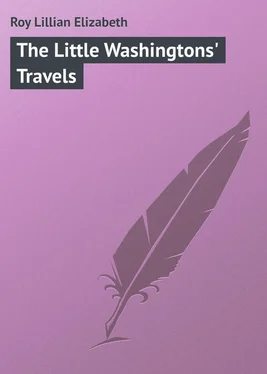Lillian Roy - The Little Washingtons' Travels
Здесь есть возможность читать онлайн «Lillian Roy - The Little Washingtons' Travels» — ознакомительный отрывок электронной книги совершенно бесплатно, а после прочтения отрывка купить полную версию. В некоторых случаях можно слушать аудио, скачать через торрент в формате fb2 и присутствует краткое содержание. Издательство: Иностранный паблик, Жанр: foreign_prose, foreign_children, на английском языке. Описание произведения, (предисловие) а так же отзывы посетителей доступны на портале библиотеки ЛибКат.
- Название:The Little Washingtons' Travels
- Автор:
- Издательство:Иностранный паблик
- Жанр:
- Год:неизвестен
- ISBN:нет данных
- Рейтинг книги:4 / 5. Голосов: 1
-
Избранное:Добавить в избранное
- Отзывы:
-
Ваша оценка:
- 80
- 1
- 2
- 3
- 4
- 5
The Little Washingtons' Travels: краткое содержание, описание и аннотация
Предлагаем к чтению аннотацию, описание, краткое содержание или предисловие (зависит от того, что написал сам автор книги «The Little Washingtons' Travels»). Если вы не нашли необходимую информацию о книге — напишите в комментариях, мы постараемся отыскать её.
The Little Washingtons' Travels — читать онлайн ознакомительный отрывок
Ниже представлен текст книги, разбитый по страницам. Система сохранения места последней прочитанной страницы, позволяет с удобством читать онлайн бесплатно книгу «The Little Washingtons' Travels», без необходимости каждый раз заново искать на чём Вы остановились. Поставьте закладку, и сможете в любой момент перейти на страницу, на которой закончили чтение.
Интервал:
Закладка:
Roy Lillian Elizabeth
The Little Washingtons' Travels
CHAPTER I
NEW YORK THE GREAT MECCA
"My parlor chair swings around every way!" exclaimed Martha Parke, thoroughly enjoying the novelty of whirling on a Pullman parlor chair.
"They all do, but folks are supposed to sit quiet and only swing when they want to see who's sitting on the other side of the car, or perhaps if a friend sits next to them and talks – then you have to turn and answer, of course," explained George Parke.
Jack Davis, the Philadelphia cousin of the two Parke children, had the vast experience of travelling from his native city to the country home of the Parkes just outside of Washington, D. C., a few weeks prior to the opening of this story. So, of course, he knew all about the Pullman parlor chairs.
"That isn't why they whirl at all! It's so you can turn to look out of the opposite windows, 'cause both sides of a railroad track have scenery, you know," glancing at the elders of the party to make sure they had overheard him.
"Why, Jack Davis! That isn't the reason at all! It's for the convenience of the conductor to take up tickets, so he won't have to lean away over or knock off the passenger's hat. Then, too, when the buffet waiter serves luncheon on those folding tables, he has to have room to move the chair around and place the stand right over the passenger's lap. Don't you remember?" explained Anne Davis to her brother.
"I'll ask mother – shall I?" ventured John Graham, a member of the travelling party from the South.
"No, no! We don't want to know anything! Let's see who can find the first church along the line," quickly said George, to divert attention.
For some time thereafter the young travellers were quiet, until Jack shouted: "I see one! It's old and tumble-down, but it has a steeple just the same!"
While the children were playing this game, the elders sat planning about the New York trip. They had started from the country estate that morning without mishap, which was remarkable, considering the many ways the "Little Washingtons" had of getting into trouble. But now that all were en route for the great city of the north, they wondered whether it had been wise to bring five lively children on such a trip.
"If John doesn't behave when you take him to visit the historical places, just let me know, and I will keep him at his great-aunt's. She hasn't a thing he can do mischief to!" said Mrs. Graham.
Mr. Parke laughed. "That would be a severe punishment for John. But I feel quite sure he will be the least troublesome of the party. George generally takes the lead in all escapades, you know."
"Not when Jack is around to suggest mischief!" added Mrs. Davis from Philadelphia.
"Well, there will be two of us, anyway, to keep them in order. And little Jim won't be here for them to use as a scapegoat, you know," laughed Mrs. Parke, thinking of the happy little face of the pickaninny who was last seen on the steps holding a book and a box of candy presented him by the Davis children.
"Did Sam wire you he would meet us?" asked Mrs. Davis of Mr. Parke.
"Yes, when I telegraphed him from home, he replied to my office in Washington. He will arrive in New York a train before us, and meet us at the Pennsylvania Terminal at Thirty-third Street. Then we will go to some large hotel until we see what we wish to do for the week."
"George sat looking over the newspaper this morning while we were waiting at the station in Washington for this train, and I leaned over to see what was engrossing his attention. What do you think he was reading?" asked Mrs. Parke.
"Goodness only knows what George reads – anything from the last drive of the Italians on the Alps to the present quotations on Wall Street!" laughed Mr. Parke, the father.
"Neither! He was poring over the list of hotels and restaurants in New York City. Finding I was watching, he said: 'I just found the place for us to stop.'
"'Yes?' said I. 'Where is it?'
"'The Martha Washington Hotel. We wouldn't think of boarding anywhere else, would we, when we are related to Martha?'"
The others laughed at this, and Mrs. Graham added: "Did you explain that that hotel was a ladies' hotel, and neither he nor his father nor his uncle would be allowed to stay there?"
"No, because he forgot all about the hotel when he saw Jack and the girls leading John over to the candy booth. That was enough for George!" laughed Mrs. Parke.
"I suppose you ladies have planned a campaign for going about to show the 'patriots' the historical points of interest in the city – that is why you came up here, you know," teased Mr. Parke.
"You came for business purposes, you said, so we will not trouble you with our plans," retorted Mrs. Davis.
But further conversation was interrupted by the children. "Mother, didn't you bring the copy of our Washington history with you?"
"I have it in the trunk. – Why?" said Mrs. Parke.
"Because Jack says Washington was in Boston in the spring of 1776, and I say he was in New York, where he thought General Howe was going after being driven from Boston," explained George.
"You are both right, son. Washington remained in Boston for a time to see just what Howe would do, and then fearing the weakness of defence of and about New York, he started for that city. It was while he was at New York that the letter from Congress was given him, in which he was so highly commended for the bravery and conduct of himself and his men at the siege," said Mrs. Parke.
Both boys had been so sure that each was right, that this information caused a sudden spell of humility, which gave the girls an opportunity to speak.
"Mother, didn't you read one day that the American army was vanquished on Long Island, and Washington had to hide up in the hills of Harlem until he got some more soldiers together?" asked Martha earnestly.
"Oh, oh! Is this the way my historical readings are interpreted?" sighed Mrs. Parke, in mock despair, while the other elders of the party laughed at Martha's presentation of the battle on Long Island.
"I think it best not to describe any more history now. When you are all on the spot of the battle scenes, the children will feel the actual spirit of the thing more than by listening to a tale," said Mr. Parke.
"I will follow your suggestion later, but just now I am not going to allow this misunderstanding to rest. Come here, children, and let me explain."
As there was nothing more exciting offered them, the five children turned their chairs about and listened to the story.
"You see, when General Howe sailed from Boston with his fleet, it was circulated that he proposed going to Halifax. But Washington was too wise a general to believe everything he heard, especially when it came from such a wily man as General Howe. So he figured out just about what Howe might do now that he was out of such nice, comfortable quarters like Boston.
"New York was another fine city, with every comfort to be had, so Washington thought that the British would prefer that life to one of privation and discomfort elsewhere.
"With the seized boats that had sailed into Boston harbor, ignorant of the fact that the British had left there, Washington was able to supply his men with guns, ammunition and goods greatly needed by them. Then, when Campbell of the British navy sailed serenely into the net of the enemy, a large quantity of military stores was captured, besides the fine vessel that carried over two hundred and seventy men. The latter were made prisoners, and the ships were turned into privateers, to act as sea-scouts in place of a regular naval force, which the colonists had not been able to raise as yet.
"Anxious for the safety of New York, Washington started an army from Boston, leaving five regiments under General Ward to defend the city. Passing through Providence, Norwich, and New London, he and the army arrived in New York on the 13th of April, where he found, as he feared, that city ill-prepared for defence against Howe.
Читать дальшеИнтервал:
Закладка:
Похожие книги на «The Little Washingtons' Travels»
Представляем Вашему вниманию похожие книги на «The Little Washingtons' Travels» списком для выбора. Мы отобрали схожую по названию и смыслу литературу в надежде предоставить читателям больше вариантов отыскать новые, интересные, ещё непрочитанные произведения.
Обсуждение, отзывы о книге «The Little Washingtons' Travels» и просто собственные мнения читателей. Оставьте ваши комментарии, напишите, что Вы думаете о произведении, его смысле или главных героях. Укажите что конкретно понравилось, а что нет, и почему Вы так считаете.












